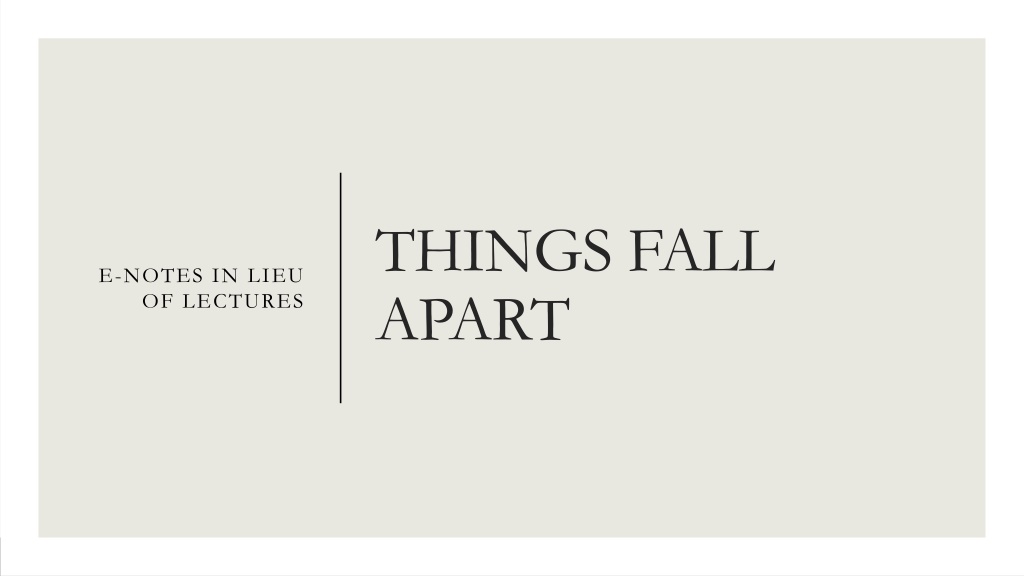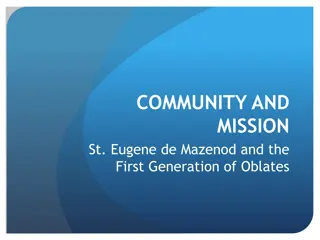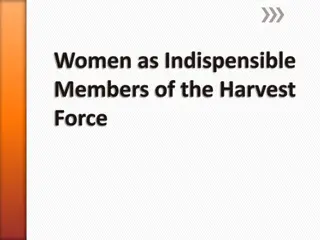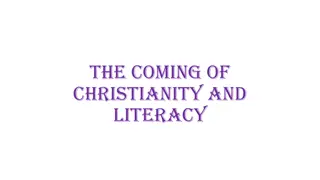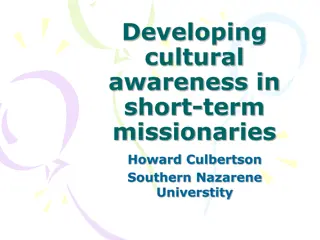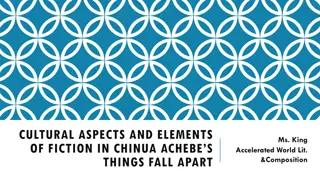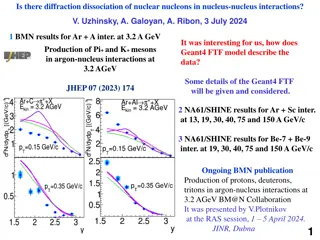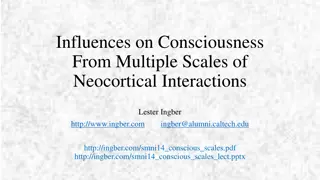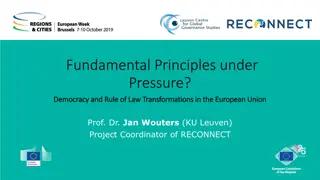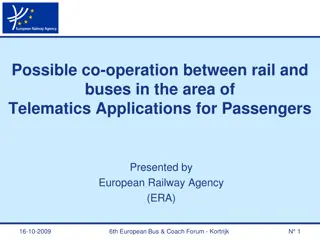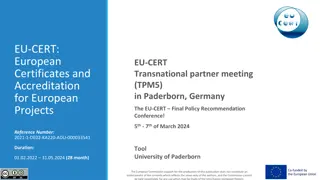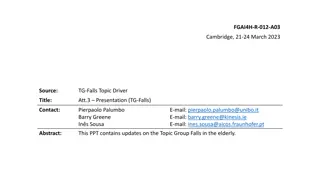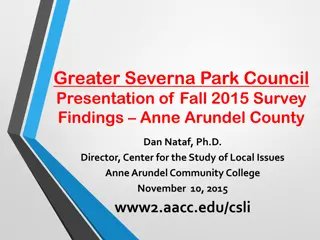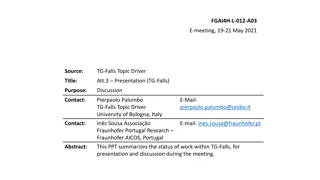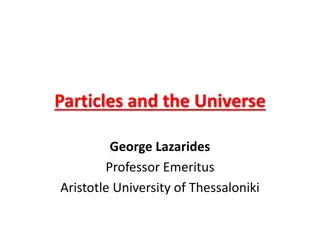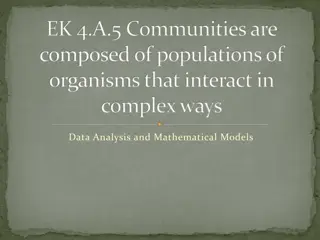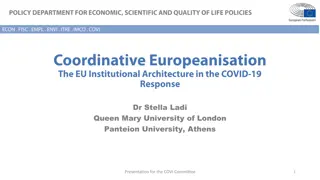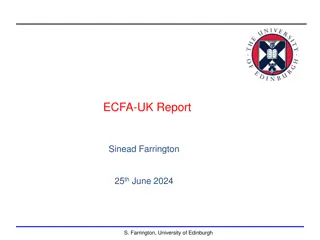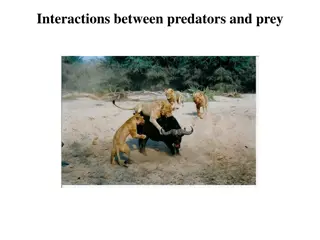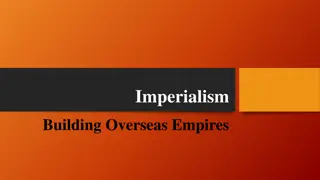Interactions and Impacts of European Missionaries in "Things Fall Apart
The narrative in "Things Fall Apart" explores the introduction of European missionaries to a Nigerian village and the subsequent reactions of the villagers. Initially viewed as comical and non-threatening, the arrival of Christianity brings about both positive and negative changes in the community, leading to conflicts and shifts in cultural dynamics. The protagonist, Okonkwo, fiercely opposes the Christian influence, which ultimately leads to personal and societal consequences.
Uploaded on Sep 27, 2024 | 0 Views
Download Presentation

Please find below an Image/Link to download the presentation.
The content on the website is provided AS IS for your information and personal use only. It may not be sold, licensed, or shared on other websites without obtaining consent from the author. Download presentation by click this link. If you encounter any issues during the download, it is possible that the publisher has removed the file from their server.
E N D
Presentation Transcript
THINGS FALL APART E-NOTES IN LIEU OF LECTURES
Introduction of European missionaries - Sad + comical How villagers react - humorous moments + making good natured fun of interpreter s dialect. Do not see missionaries as a threat initially, do not react violently like Abame village. Missionaries call their gods falsegods . However, do not forcibly thrust Christianity on the village as was often the case when Europeans colonized indigenous peoples
Arrival of Christianity - good points: 1. Nwoye drawn to it because it seems to answer his long held doubts about aspects of Ibo religion (newborn twins abandonment, Ikemefuna s death). 2. Church offers refuge to lower status individuals. A pregnant woman s four sets of newborn twins thrown away to die seeks refuge to avoid repetition of misfortune. Church offers alternative religious value system. 3. Men without titles find affirmation of their individual worth. Osu able to leave their position as a despised, ostracized caste and enter the church as equals with other converts.
Okonkwo wants Mbanta to drive away Christians with threats of violence. Has vested interest in rejection of Christianity: 1. If Mbanta does not drive the missionaries away, his killing of Ikemefuna loses part of its religious justification. Damage to his relationship with Nwoye seems more pointless than before. Both matters become his mistake rather than result of divine will. 2. High status men like Okonkwo view church as threat as it undermines cultural value of their accomplishments. Titles, religious authoritarian positions, leaders lose their force & prestige if lower status men convert.
Nwoyes conversion kills Okonkwo in spirit. Has always treated him harshly but placed great deal of hope in his potential as great clansman. Nwoye s actions also undermine Okonkwo s status, prestige. Okonkwo s inability to adapt to inevitable change colonialism gets which ultimately ends his relationship with son. Cannot accept this. Nwoye is pained by father s angry reaction.
Despite challenges church represents, Mbanta content to live & let live Village reacts wrt to Ibo commitment to peaceful, friendly relations Conflicts arise when converts and missionaries openly disrespect their customs but clan leaders vote for peaceful reaction Okonkwo wants to react violently. Although Ibo culture strongly emphasizes relatively democratic values, Okonkwo not happy with decision to have peace. Wishes that village would act against their cultural values in order to preserve them. Okonkwo s insecurity is motivation for his reaction.
Arrival of white colonists and their religion weakens fundamental structure of Ibo culture. However, Ibo religion intimately connected to kinship bonds. Thus a devout Ibo individual automatically expresses strong loyalty to his kinsmen. Ancestral worship plays v imp role. Therefore, conversion to Christianity is partly a rejection of Ibo structure of kinship.
Christian religion replaces literal ties of kinship with a metaphorical kinship structure through God After argument with Okonkwo, Nwoye tells missionary he wishes to go to school in another village. Overjoyed, missionary states, Blessed is he who forsakes his father and his mother for my sake. Church well aware that central obstacle to success is strength of lbo kinship bonds. Goes to great lengths to weaken literal kinship bonds of Ibo community to replace them with metaphorical kinship bond through God
White colonial Government subjects Ibo individuals to their justice system Does not respect Ibo culture s own advanced institutions for self- Government Many of their punishments also destroy offender whereas Ibo s own justice system tries very hard to allow individual to atone for his wrongs without destroying him, or his relationship to his community.
Okonkwo s feast a tribute to kinship between his and his mother s family. However, it is also a mourning rite, because colonial Government and religion will eventually weaken the mystical, religious power and symbolism of Ibo kinship structure However, Ezinma remains a comfort to Okonkwo throughout his troubles. She understands her importance to his position in community, and has considerable influence over her sister. Moreover, she also has a quick temper like her father. Of all his children, she resembles him the most.
Mr. Brown far more enlightened than average white colonist. Capable of respecting traditional Ibo beliefs. Does not want his flock to antagonize clan. Shares their belief in value of peaceful, harmonious relations Possibility of cross-cultural communication. Brown befriends prominent clansman, discusses religion with them without insults and violence Brown also guilty of holding oversimplified view of indigenous religious belief that Ibo worship wooden & stone carvings, which is not true Carvings used as channel to spiritual world. However, through peaceful, respectful dialogue, Mr. Brown and Akunna learn more about the other s religious beliefs. They differ, but they also share some things in common.
Arrival of Christian church and white colonists brought some good: 1. Cross-cultural contact provided economic benefits to indigenous peoples. 2. Hospital helps in treating some illness. 3. Brown urges Ibo to send their children to school. Keenly aware of trend in colonial Government (CG) to rob Ibo of self-government. Urges Ibo to adapt so that they do not lose all autonomy Difficult to see this in entirely positive light. CG does not relate to Ibo on their own cultural terms. Ibo must relate. CG punishes individuals for abandoning newborn twins to die without making an effort to understand cultural and religious tradition behind the practice.
Mr. Smith causes conflict between church and clan with his refusal to understand and respect traditional Ibo culture. Brown more lenient with converts retention of some old beliefs. Did not draw a clear line. Smith demands complete rejection of old beliefs. Inability to practice mutual respect and tolerance incites dangerous zealous fervor in some of the more eager converts. Eg - Enoch s insult to traditional Ibo culture Church renamed converts emphasizing their difference from traditional Ibo community. In many ways church exacerbated conflicts by demanding that converts literally and symbolically cut their ties to traditional Ibo religion.
Language barrier allows a crucial misunderstanding to take place. Mr. Smith does not know that his interpreter chose to reinvent his statement of defiance against the egwugwu s plan to burn the church. Therefore, he believes that the egwugwu are openly showing disrespect for the church and his authority. The colonial government likewise does not attempt to understand the cultural influence behind the egwugwu s actions.
Okonkwo s desire to react violently to church not completely motivated by desire to preserve clan s cultural traditions. Had wanted to make a big splash with his return to his village. Church changed village so much that his return does not incite the interest he wanted; his motivations thus deeply personal + humiliation in jail = revenge. Wars of revenge, or wars of blame not just wars. Ibo religious beliefs forbid this. Okonkwo does not wait for clansmen to decide their course of action before he kills court messenger. Acts rash. Unoka s words regarding bitterness of failing alone comes to have real significance in Okonkwo s life. He values his personal success and status over the survival of the community, and he fails alone. Despite his great success and prestige, he dies in ignominy like his title-less, penniless father.
The D.C. is a pompous little man who thinks he understands indigenous African cultures. His book will be full of European stereotypes of native Africans and European cultural hubris. His paragraph on Okonkwo will be inaccurate and self-serving like so many European portraits of native Africans. Achebe s novel is an answer to such inaccurate stereotypes. Okonkwo is a tragic hero of his people. Despite his flaws, he is a complex individual who represents the complexity of his culture, and his story is deserving of far more than a single paragraph in some white colonist s book. Okonkwo s story is an Ibo narrative, not a European one.
